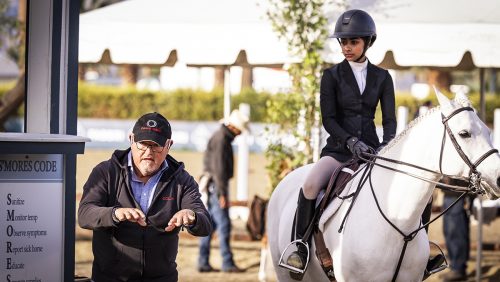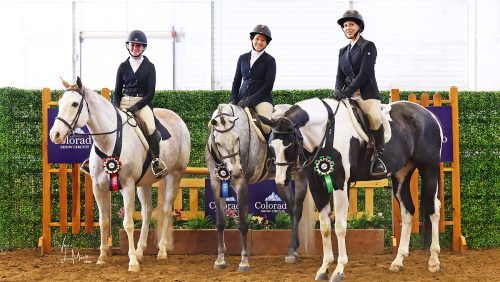t had been a frustrating year for Janet Hischer. The Arizona trainer had come close to winning a grand prix half a dozen times, but she could never quite make it to the blue.
“I was second in the $60,000 in Denver,” she said. “I had the fastest time, but I had a rail. I was second in the two here in Scottsdale by tenths of seconds.”
Hischer’s year-long dry spell finally ended at her last show of the year. She took Rose Bergdale’s Carpe Diem to the win in the $20,000 Grand Prix of Scottsdale, one of the featured classes at the Arizona Season Finals, Nov. 15-19.�
Hischer’s win was by no means a foregone conclusion. She turned in a quick clear round, but there was still one horse left in the jump-off. The rider was California professional Kristin Hardin, who is known for going very fast. Her horse had a turn of speed, too.
“I actually used to own her horse, so I knew he could go fast,” Hischer said.
Hischer, who operates her Twisted Tree Farm in Scottsdale, confessed to rooting against her friend. “I was saying, ‘Slow down, rail, nothing personal; I really like you, Kristin, but I want to win,’ ” said Hischer, laughing.
Her prayers were answered–Hardin had the last fence down, and Hischer finished the year a winner. She also concluded her first grand prix season as the American Grandprix Association Rookie of the Year by virtue of her consistent placings.
Ashley Dennehy and Burberry began the year as winners and finished up the same way. They won all five classes in the amateur-owner hunters in Scottsdale, took first in the junior/amateur hunter classic, and led the victory lap in the $10,000 Fast Lane Farm open Hunter Classic.
Dennehy, who trains with her husband Michael Dennehy in Parker, Colo., said she was a little tired after all the travel and competition. “I’m really glad it’s over. It’s been a long year,” she said.
Dennehy may have been worn out, but Burberry was as fresh as she’d been in January. “Today she was even a little feisty,” she said. “I expected her to feel a lot more like I felt, but she’s ready to keep going.”�
Once all the points are added up, Burberry will be the U.S. Equestrian Federation horse of the year in the amateur-owner, 18-35, division. She’ll get a bit of a break before beginning the whole campaign again early next year.
“She’s going to go home and get turned out. She eats a lot and does whatever she wants to do,” Dennehy said.
Dennehy has been offered quite a bit of money for the Hanoverian mare but insisted she’s not for sale. “I can never replace her in my heart,” she said. “She’s my baby. She’s not going anywhere.”
ADVERTISEMENT
Rachel Poole was the champion in the junior hunters with her Kazan. The big warmblood had an earlier career as a top equitation horse and needed a little time to learn his new job.
“When I first tried him, it wasn’t the best–he was kind of traumatized,” said the Scottsdale, Ariz., teenager. “There was something about him that I liked; I wasn’t sure what. I just had a good feeling about him.”
She and her trainers, Sherry Templin and Renae Coates, decided to buy him in the hopes that the retooling job would be successful. “He turned out to be great,” Poole said. “He’s a teddy bear.”
Smart Purchases
Kris Nixon rode Susanne Stroh’s Better Days to the championship in green and regular working hunters and finished second in the $10,000 Fast Lane Farm Open Hunter Classic.
Nixon, who operates her Noontide Farm in Parker, Colo., had purchased the horse for one of her amateur customers. When the horse, formerly campaigned as Chappelle, came up for sale, Stroh bought him immediately.
“Susie really likes that horse, and she enjoyed watching him even when she didn’t own him,” Nixon said. “She didn’t want him to leave the barn.”
Stroh has no plans to show Better Days herself; she just wants to watch him go around in the open hunters. Nixon, needless to say, is delighted with this plan. “That’s absolutely my favorite division, the regular working,” she said. “And this is one of the nicest four-foot horses I’ve ever had.”
Patience is sometimes the key when you are looking for just the right horse. Pam Stubbs first saw Absolut’ Mocha as a 2-year-old in the International Hunter Futurity in Kentucky.
“I really fell in love with him then, but he was not for sale,” said the Scottsdale, Ariz., amateur. “I saw him again when he was 3, fell in love with him even more, but not for sale. I saw him again as a 4-year-old and really wanted him then, but not for sale. I gave up.”
Stubbs, who trains with Becky Warner, retired her hunter Schoman last year. That made the search for a new horse a bit more urgent. “I didn’t want to start with a baby green horse,” she said. “I wanted something I could step right into the ring with.”�
Then an ad appeared in the Chronicle, offering Absolut’ Mocha for sale. “I couldn’t believe it,” Stubbs said.
She and Warner flew to Kentucky and tried the horse. It was a perfect match and an immediate sale. “He’s a real amateur horse. He never looks at anything in the ring, smooth and comfortable to sit on,” said Stubbs.
It was no accident that Stubbs was at the IHF; she’s on the IHF board and is a major booster for hunter breeding in her zone. One of the most important parts of the program is the education that young horses get by competing in breeding classes.
“They get out as yearlings and 2-year-olds a little bit,” Stubbs said, “and get braided and into the rings, stay overnight in a stall, and by the time they’re 4 and 5 and ready to show, they’re easy to bring along.”
ADVERTISEMENT
Stubbs and Absolut’ Mocha were the adult amateur, 36 and over, hunter champions at the Arizona Season Finals.
Sharing The Love
Her mother’s love helped Caroline Hardy earn the adult amateur, 18-35, championship.
“He’s my mom’s hunter. She’s been showing him all year,” said Hardy, who rode Caramello to the high-point award. “My jumper got sick, so she said I can have Caramello now while the jumper gets better.”
Hardy works in the biotech industry, a job she greatly enjoys. Right now she’s directing a project that is developing a simple blood test for earlier detection of breast cancer. It is rewarding work, but it’s also very stressful. Her riding helps keep her going. “It’s definitely therapy,” she said.
Hardy, who trains with Becky Warner, gets to work from home one day a week and puts that time to full use. “Wednesday mornings I ride at about 6:30, in the dark, and pretty much stay in my breeches all day working from home,” she said.�
Michelle Hale and Taarento were the winners of the adult amateur hunter classic. The name is a slight variant on the Japanese word “tarento,” which in its turn is a version of the English word “talent.” In Japanese, it means a famous television personality.
“I added an extra A to it because I thought that looked European,” said Hale, smiling.
Hale, who trains with Betty Beran, got Taarento a little over a year ago. He came from a dressage barn, where he was not working out. “They brought him over and wondered if he might be able to jump,” Hale recalled. “Betty sat on him once, and said, ‘Yes.’ “
Hale showed extensively as a junior and then walked away from riding without even glancing back. Her husband urged her to go back to the sport, but she simply wasn’t interested.
“I gave it up for a long time, 10 plus years,” Hale said. “I ran into Betty socially at one point, and she said, ‘Hey, come out and ride.’ ” It took about three days in the saddle to get Hale every bit as hooked as she had ever been as a teen.�
Ashlee Bolwar, of Paradise Valley, Ariz., rode her Salterella to the win in the children’s/adult amateur jumper classic. Bolwar and her Belgian mare have won four out of the five classics they’ve entered this year and been champion numerous times.
“She is fast and she is careful,” said Bolwar of her horse. “We get along really well together.”
Bolwar, who trains with Kathy Johnson, has recently been stepping up to the bigger jumps in the junior/amateur modified division. That extra 6 to 9 inches makes a big difference.
“You have to be a lot more concentrated, and you can’t mess up over the bigger jumps,” she said.
Bolwar, 16, is not sure what sort of career she’ll end up in down the road. It has to be able to support her horses, though. “Something where you make a lot of money,” she said, laughing.
Matt Hinton














